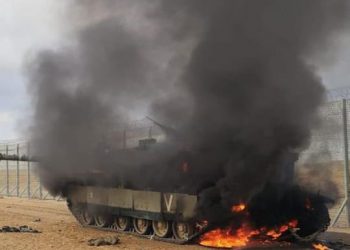Residents in Russia’s Belgorod region are being relocated to other areas as authorities work to clear the territory after a group of anti-Putin Russian fighters aligned with the Ukrainian army seized a checkpoint and launched an attack. The incident has left Moscow confused and angered, with many speculating about the motives and implications of the attack. This article provides an overview of what has transpired and the key questions surrounding the event.
The attack in Belgorod was claimed by a group of Russian nationals who oppose Putin’s regime and have aligned themselves with the Ukrainian army. Russia’s Investigative Committee launched an investigation into the incident, stating that residential areas and civilian infrastructure were targeted, resulting in several civilian casualties. Unmanned aerial vehicles (UAVs) also struck two areas in the region, causing further damage.
Regional Governor Vyacheslav Gladkov confirmed that one civilian had died, and approximately 100 people were evacuated from the border settlements of Glotovo and Kozinka. Aleksey Baranovsky, a representative of the Kyiv-based Russian Armed Opposition Political Centre, stated that the operation began on Sunday night and was still ongoing. However, the exact number of fighters who crossed the border into Russia was not disclosed.
The Russian Ministry of Defense reported that their forces successfully repelled the attackers back into Ukrainian territory using airstrikes, artillery fire, and military units. The Ministry claimed that the nationalists were eliminated within Ukrainian territory. The attackers’ actions appeared to catch Russian authorities off guard, as they managed to gain control of a border post, resulting in images of Russian nationals openly opposing the Kremlin.
The attack has raised various questions about the motives and implications. Some view it as a military tactic aimed at confusing and distracting Russian commanders ahead of a potential offensive by Kyiv. Others speculate whether this incident signifies the emergence of serious armed opposition within Russia or if there are other hidden forces at play. The confusion surrounding the attack has been reflected in Russian commentators’ reactions, with panic, factionalism, and incoherence prevalent in the country’s information space.
The groups involved in the attack, namely the Freedom for Russia Legion and the Russian Volunteer Corps, describe themselves as patriot volunteers seeking to liberate Russia from what they perceive as Putin’s tyranny. One fighter, known as “Caesar,” who joined the Ukrainian effort against Russian attacks on Bakhmut, explained his motivation as defending the people of Ukraine and freeing his own country from oppression.
The incident has sparked contrasting accounts from Russia and Ukraine. The Kremlin claims that the attackers were Ukrainian militants, while Ukrainian officials state that the Russian fighters are acting independently. The Ukrainian National Security Advisor emphasized that the incident is solely a Russian matter, and those involved are Russians seeking to combat the darkness within their own country.
The attack in Belgorod is unlikely to shift the overall momentum of the war in Ukraine, which has seen minimal territorial changes in recent months. However, it has the potential to shape the narrative surrounding the conflict in both Russia and Ukraine. The Russian government may use these attacks to further portray itself as a victim and justify increased aggression against Ukraine. Putin might also divert attention from the struggling frontlines, where his forces have faced difficulties in making significant advances.
As questions continue to surround the incident in Belgorod, it remains to be seen how it will impact the ongoing conflict between Russia and Ukraine and the dynamics between the two countries.


